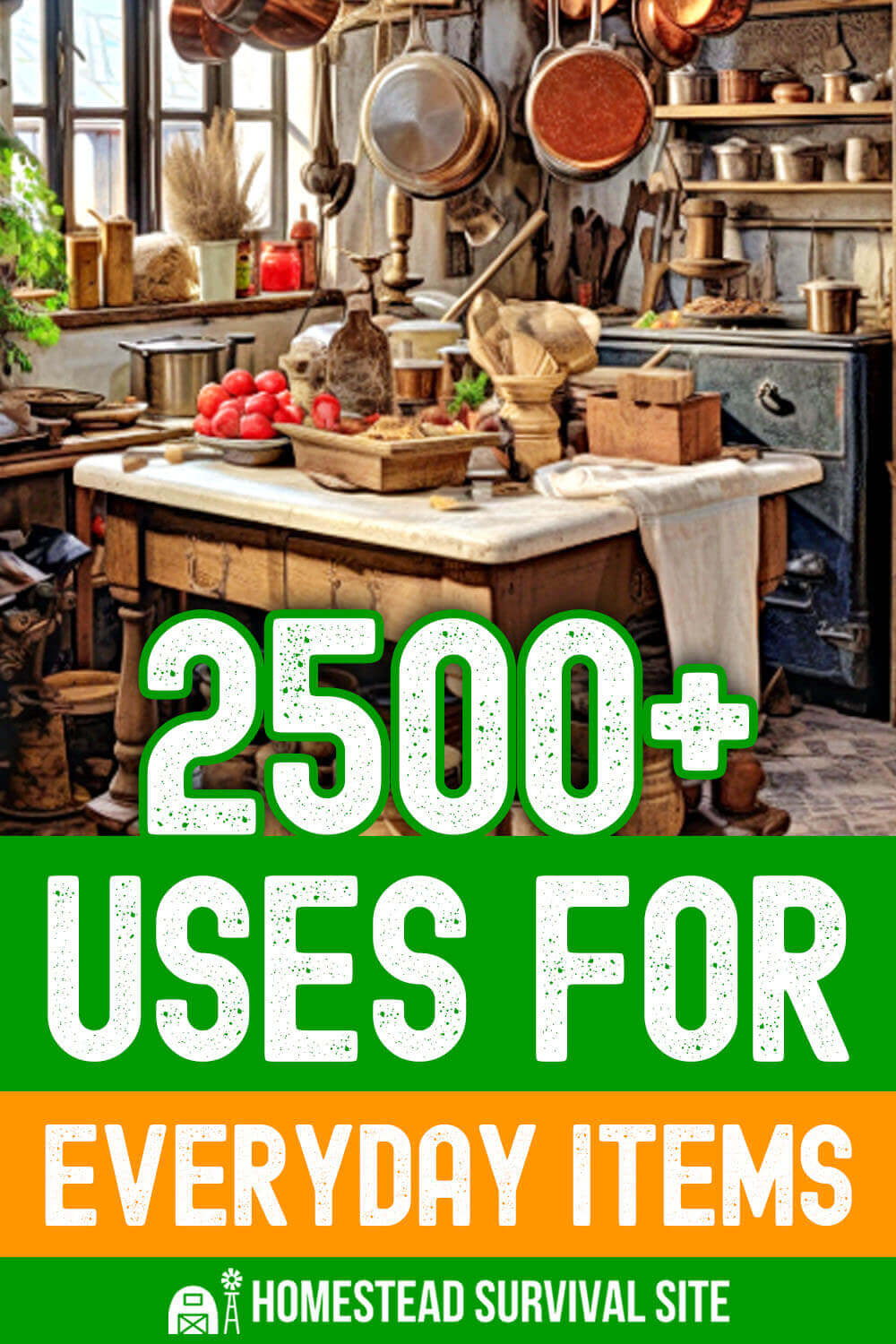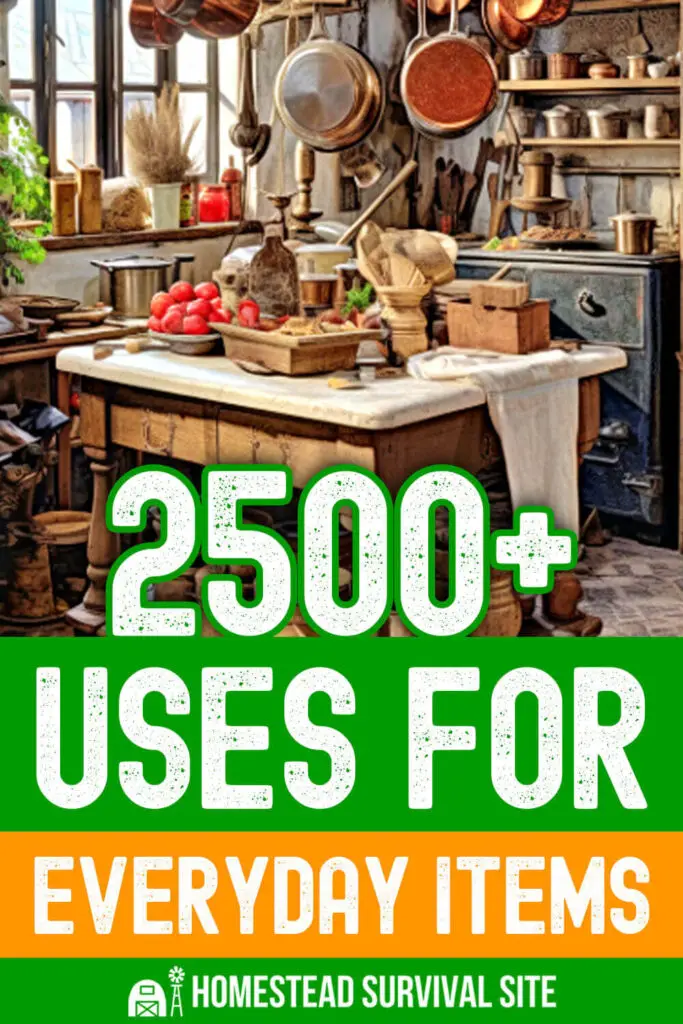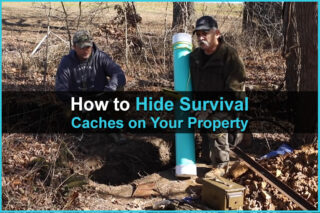Estimated reading time: 26 minutes
This is one you're going to want to bookmark. It's the ultimate index to survival uses for everyday items. Below you'll find a list of nearly 100 ordinary items that have all sorts of survival applications. I did the math, and it adds up to 2,511 survival uses!
I put the items in alphabetical order, and next to each item I listed some of my favorite uses for it, but I couldn't include all of them because if I had, this post would have been insanely long—like the length of a short book.
However, each list item is also a link to an article where you can learn all about the particular survival uses, so be sure to click that to see every use and how to do them. As I said, this is an index.
Want to save this post for later? Click Here to Pin It On Pinterest!
Now on to the list…
Activated Charcoal (25 Uses)
Activated charcoal is a miraculous substance that should be in every emergency kit. It's good for your skin, whitens your teeth, eases intestinal discomfort, absorbs poisons, filters air and water, prevents rust, and deodorizes your fridge. On top of all that, it's very affordable.
Alcohol (27 Uses)
When I say alcohol, I'm not talking about beer or wine, but hard liquor of 70 proof or above such as gin, whiskey, or vodka. It can be used to start a fire, repel bugs, fuel a lamp, fuel a stove, ease pain, as an antiseptic for a wound, as a numbing agent, to sterilize medical instruments, and more. Just don't drink it all before you get a chance to use it.
Altoid Tins (13 Uses)
Even if you don't like Altoids, it's still worth purchasing a few tins. These little tins are very handy because they can be used to make all sorts of mini kits. For example: fire kits, fishing kits, first aid kits, survival kits, and more. You can even use them to make a candle or bake some bread.
Aluminum Foil (33 Uses)
The weight to usefulness ratio of aluminum foil is very good. So good that it's definitely worth folding some up and putting it in your bug out bag. You can use it to catch fish, start a fire, keep tinder dry, cook food, boil water, fix loose batteries, enhance antennas, reflect heat, signal for help, and more.
Ammo Cans (50 Uses)
Nope, they're not just for storing ammo. Because ammo cans are designed to be very sturdy and waterproof, you can turn them into many other things such as a grill, an oven, a tackle box, a space heater, a first aid kit, a 72-hour kit, a Faraday cage, a survival cache, or a storage container for anything you want to keep dry.
Apple Cider Vinegar (101 Uses)
Apple cider vinegar has all sorts of health benefits, but it can also be used for cooking, keeping pests away, killing weeds, washing pets, whitening teeth, treating acid reflux, clearing sinuses, and much more.
Axes (6 Uses)
Not just for chopping wood. Axes and tomahawks can be used to start a fire, cut through ice, defend yourself, field dress and animal, and signal others.
Baby Wipes (31 Uses)
If you want to keep yourself clean but water is in short supply, baby wipes are very convenient. But they're not just good for keeping clean. You can also use them to clean dishes, soothe a sunburn, cool your face off, wipe down dirty surfaces, use as a temporary face mask, and more.
Bag Balm (22 Uses)
This is a must if you have dry skin. It heals cracked skin like magic. It's also great for sunburns, cold sores, cow udders, dog paws, chafed nipples, diaper rashes, and many other skin ailments on both humans and animals. You can get a sizeable container for just a few bucks.
Baking Soda (101 Uses)
This stuff is so useful that I keep an extra twenty-pound bag of it in my pantry at all times. Baking soda can be used to clean teeth, treat insect bites, cleanse your skin, wash the dishes, clean the kitchen, boost laundry detergent, extinguish fires, and deodorize things such as shoes, trash cans, and refrigerators.
Bandana (98 Uses)
At 98 uses, the bandana is the most useful item on this list. Every prepper should have a bandana handy as it can be used as a dust mask, a neckband, a water filter, a blindfold, a trail marker, a coffee filter, a pot holder, a rope or belt (by tying several together), and more. The sky's the limit.
Baseball Caps (10 Uses)
I regularly wear a baseball cap if I don't feel like combing my hair, but only recently did I realize its many survival uses. It can be used to prefilter water, dress a wound, store gear, start a fire, as a pot holder, as a cool compress, and more.
Bed Sheets (22 Uses)
Most people throw away old bed sheets, but this is a huge waste of fabric. Instead, you can turn them into napkins, cleaning cloths, tablecloths, furniture covers, pillows, curtains, bandages, ropes, tourniquets, or almost any other simple item made of fabric.
Beer Bottles (15 Uses)
If you need an excuse to stockpile cases upon cases of beer, here it is. You can use beer bottles to make a weapon, boil water, transport water, keep things dry, or start a fire. And I'm sure there are plenty of other uses no one has considered yet.
Bleach (28 Uses)
For most preppers, when they think of bleach, they think of it as a way to disinfect water. But even if you already have a good water purifier, you should still keep some bleach on hand to sanitize food preparation surfaces, clean raw fruits and veggies, destroy mold and mildew, and prevent the spread of disease.
Bobby Pins (25 Uses)
These tiny little things are cheap yet can be used as a money clip, a nail holder, a zipper pull, a sewing needle, a screwdriver, a lockpick, a bookmark, a clothespin, and much more.
Borax (31 Uses)
If you make your own laundry detergent (which is much cheaper the store-bought detergent, by the way), then you probably already know about borax. In addition to cleaning clothes, it can clean tubs, brushes, toilets, drains, sinks, counters, dishes, the floor, and more. It can even remove stains, eliminate odors, keep pests away, and kill weeds. Great stuff.
Buckets (53 Uses)
When it comes to food grade buckets, the number of uses just depends on your imagination. And even better, you can get them for free at most grocery stores and bakeries. You just have to ask. Once you have them, you can use them to grow plants, raise chickens, store supplies, wash clothes, carry gear, catch fish, and much more.
Bungee Cords (7 Uses)
Most people have a few of these in the trunk or garage. In a pinch, they can be used as a belt, to build a shelter, to bundle and organize gear like blankets and sleeping bags, and even to catch fish.
Candle Wax (10 Uses)
If you've been burning candles, don't throw away the wax. You can use it to make new candles and firestarters. You can also use the wax to make matches waterproof, prevent rust on your tools, replace a lost filling, seal small holes in window frames, and several other things you'd never think of.
Carabiners (30 Uses)
These handy little items are great to have around. You can use them to hook things to your bug out bag, hang a clothesline, tighten a rope, hang things up, keep keys together, tenderize meat, hang signs, make a slingshot, make a coat rack, and more.
Cat Litter (7 Uses)
I have two cats, and I hate cleaning the litter box, but I can console myself knowing that the unused litter I keep on hand could be used in an emergency toilet, to reduce oil stains, to help my garden plants take root, to gain traction if my car gets stuck in the snow, and even to remove radioactive toxins from produce.
Chap Stick (20 Uses)
I don't use chapstick myself, but I have a stick in my bug out bag anyway in case I want to use it to prevent blisters, help start a fire, make a candle, fix a zipper, patch tiny holes, clean my glasses, or stop small cuts from bleeding, among other things. I also used the container to make a tiny survival kit.
Charcoal (7 Uses)
Not just for grilling out. Charcoal can be used to absorb odors, heal a wound, stop diarrhea, filter water, or leave a message on a surface such as concrete. You could even use it to camouflage yourself in the wilderness while hunting.
Chocolate (10 Uses)
Admittedly, some of the hacks on this list are kind of iffy, such as making hot chocolate or using it as a morale booster. However, I do think it could be a very popular barter item, and you can use it to rust-proof tools, polish metal surfaces (in fact, if you polish the bottom of a soda can, you can focus a beam of sunlight enough to start a fire).
Cigarettes (7 Uses)
Here's another one that could become a popular barter item. The tobacco can be used to treat insect bites, relieve a toothache, or start a fire. You can also use it to make a pesticide, or you can use the ash to stop bleeding from small wounds.
Clothes Pins (25 Uses)
Every prepper should already have a clothesline and pins in case they don't have the power to run their dryer. But you can also use the clothespins to organize your stuff, keep notes together, hold a match steady, make some tinder, make a tiny stake, label your cords, fix your glasses, or hold your hair back (just ignore the people who laugh at you when you do this).
Coconut Oil (39 Uses)
This is probably the most popular multipurpose food in the world, but it's not just good for your health. It can also treat bruises, soothe burns, treat allergies, and more. Plus, you can use it to shave, wash your hands, and brush your teeth. And in the field, it can clean leather, preserve wood, lubricate gear, and more.
Coffee Filters (35 Uses)
These are incredibly useful. You can use them to prefilter water, make a disposable bowl, organize small items, make a cold compress, make a bandage, make a funnel, store seeds, sprout seeds, start a fire, blow your nose, and most important of all: make coffee! Everyone needs energy during a disaster.
Coffee Grounds (5 Uses)
The coffee grounds themselves only have a few uses, but they're worth knowing. You can use them to freshen your fridge or freezer, scour your pots and pans, remove odors from your hands, and keep animals off your lawn.
Condoms (11 Uses)
Most people would never consider putting a condom in their survival kit, but they should. You can use it to hold tinder or anything that needs to be kept dry, you can use the condom itself as tinder, you can use it as a medical glove, you can turn it into a slingshot, and you can even protect the muzzle of your rifle. Wrap a condom over it and it will stop sand, water, and mud from getting inside.
Cooking Oil (25 Uses)
Cooking oil is incredibly useful as a lubricant, lamp oil, furniture polish, paint remover, hair moisturizer, label remover, plant protector, gun cleaner, and more.
Cornstarch (35 Uses)
This is a great thing to have in your food storage anyway, but it also has many household uses such as removing stains, cleaning carpets, deodorizing shoes, washing windows, and repelling cockroaches. You can also use it to clean your hair, treat sunburns, treat minor cuts, soothe sunburns, and more.
Crisco (16 Uses)
Most preppers and homesteaders know that you can turn a can of Crisco into a candle, but you can also use it to make soap, remove gum from hair, preserve kitchen utensils, season cast iron skillets, make shoveling snow easier, and more.
Diapers (6 Uses)
There's no need to stock up on diapers if you don't have small children. But if you do happen to have diapers around, you can use them as bandages, ice packs, cooling towels, shoe padding, or to prefilter water.
Dish Soap (10 Uses)
Everyone has a bottle of this by the sink, but not everyone knows it can keep bugs away, make your lawn greener, kill weeds, treat poison ivy blisters, and even unclog toilets.
Drinking Straws (5 Uses)
Thick straws are great for making firestarters, but the regular ones can be used to organize tiny items like seasonings and medications, and they can keep small things–such as tinder–nice and dry.
Dryer Lint (6 Uses)
Most preppers are already aware of how great dryer lint is for starting a fire, but you can also use it for insulation, to make dryer lint candles, or to add some carbon and fiber to your compost pile.
Duct Tape (20 Uses)
Easily one of the most useful items on this list, duct tape is the McGyver of household items. You can use it to build a shelter, fix your clothes, keep your feet warm, patch leaks, mark a trail, hold a bandage in place, make a splint, kill bugs, seal containers, and all sorts of other things. You'd be crazy not to have a roll on hand.
Flashlights (8 Uses)
Nope, not just for lighting your way in the dark. Flashlights can help start a fire, disorient an attacker, signal for help, defend you from enemies, and more.
Floss (27 Uses)
A roll of dental floss is so small and lightweight that you may as well put one in your bug out bag, not just to clean your teeth but to build a shelter, make a tripwire alarm, hang clothes to dry, make a snare, catch fish, cut food, hang food, start a fire, stitch a wound, and more.
Food Storage Containers (19 Uses)
I go through dehydrated foods such as bananas and mashed potatoes on a regular basis, which means I'm left with empty #10 cans. I used to throw them away, but now I've been using them to organize stuff in the garage and in the kitchen. Some people use them for target practice, container gardening, building a rocket stove, or making a mini survival kit.
Frisbees (10 Uses)
Beyond playing games with a frisbee (which can help boost morale in an SHTF survival situation), you can also use an ordinary frisbee for a variety of survival purposes including as a plate (clean it beforehand, of course), a shovel, a paddle, a fan, collecting rainwater, or as a reflector (just cover it with tin foil).
Garlic (11 Uses)
Garlic is good for your heart and is a powerful antibiotic. It can also treat things like colds, acne, and splinters. Or you could use it to catch fish, keep bugs away, and even clean your kitchen.
Glow Sticks (12 Uses)
You can always find lots of these for cheap right after Halloween. They can be very handy in a power outage or on a camping trip. You can also use them to mark a trail, signal for help, or make a perimeter alarm.
Hand Sanitizer (3 Uses)
Hand sanitizer serves several big when it comes to survival. First, it can be used as a personal hygiene or cleaning agent for surfaces. Due to the fact that it contains high levels of alcohol, it is highly flammable and can help you get a fire going in a matter of minutes.
Honey (23 Uses)
Almost everyone knows honey is a very healthy sweetener, but they might be surprised to find out just how many ways it's healthy. Honey can heal wounds, soothe sore throats, relieve a cough, treat burns, lessen allergy symptoms, moisturize skin, and more. Just make sure you buy real honey made by bees and not imitation honey.
Hydrogen Peroxide (48 Uses)
Most people know this as the brown bottle of acid your mother tortured you with when you got a scrape as a kid, but it does much more than disinfect wounds. Hydrogen peroxide can clean fruits and veggies, remove mold, get rid of soap scum, clean carpets, remove odors, whiten laundry, remove stains, ease toothaches, and fight cold viruses.
Knives (15 Uses)
Obviously, knives are incredibly important to survivalists for things like cutting, slicing, whittling, prying, piercing, and so forth, but you could also use it as a spatula, to stake your tent quickly, to sterilize a wound (after heating it up), and more. Technically, there are hundreds of things you can do with a good knife.
Lemons (10 Uses)
Lemons add zest to lots of dishes, but they're also useful for degunking graters, removing fruit stains, preserving produce, polishing stainless steel, keeping pests away, or freshening your microwave.
Lipstick (9 Uses)
This article surprised me when I first read it. I didn't know the petrolatum in lipstick could help you get a fire going. You can also use it for barter, to write a message, and to lubricate gears. Plus, the container is good for holding small things like matches.
Mayonnaise (25 Uses)
Mayonnaise isn't just for making sandwiches. It can be used in all sorts of recipes, but you may be surprised to learn that it can kill lice, remove stickers, polish houseplants, get gum out of hair, soothe sunburns, remove crayon marks, or even loosen a tight ring.
Metal Coffee Cans (21 Uses)
Modern coffee cans are usually made of plastic, but some of them are still made of metal. These are the ones you want to use. You could use them to make a mini survival kit, a small stove, a mini heater, a food container, or a plant container. They're very useful on homesteads for scooping water or livestock feed, protecting small plants, catching milk when milking a goat or cow, and so forth.
Mouthwash (14 Uses)
I use it every day to freshen my breath, but in a pinch, I could also use it as an antiseptic on a cut or scrape, to clean cookout equipment, to soothe rashes and bug bites, or to sanitize my hands.
Mylar Blankets (25 Uses)
I'm not a huge fan of Mylar blankets since they can tear easily, but given that they're so lightweight and have so many functions, I keep a few in my bug out bag anyway. They can be used to signal for help, collect rainwater, make cordage, boost radio reception, start a fire, keep your feet dry, keep edibles dry, and more.
Nail Polish (13 Uses)
There are some very creative ideas for how to use nail polish such as reconditioning worn out lures, mark sight dots on your firearms making them easier to see, waterproof matches, color code keys, keep tiny screws in place, and prevent metal objects from rusting.
Olive Oil (11 Uses)
Not only is olive oil very good for your health, it can be used around the house to lubricate hinges, free a zipper, remove sticky substances, clean leather, and even fuel a lamp.
Pantyhose (20 Uses)
Although most men are pretty reluctant to wear pantyhose, they could actually prevent blisters, stop bug bites, and keep their legs warmer by doing so. Pantyhose can also be used as cordage, as a mask, to sprout seeds, to dry tinder, and much more.
Paper Clips (28 Uses)
Paper clips are tiny, cheap, and lightweight, and you can turn one into a compass, a zipper tab, a clothing hook, a keyring, a finger splint, a fish hook, a sewing needle, an antenna, a lockpick, a toothpick, a plant hanger, a meat skewer, and more.
Paracord (93 Uses)
After bandanas, paracord is the second most useful item on this list and a must-have for any survival kit. It can be used to build a shelter, tie things together, keep items secure, make a snare, use for a bow drill, make a tourniquet, create a pulley system, climb a tree, bundle firewood, and even catch fish (if you use a single strand).
Pencils (13 Uses)
Pencils can be used to help with starting fires, filtering water, creating a splint, extending the life of rechargeable batteries, and more. Plus, you may want a pencil for keeping a journal. After all, if you're living through a grid-down disaster, it might be worth documenting.
Pill Bottles (22 Uses)
Anyone with a prescription has a few of these lying around somewhere. Once the pills are gone, use the container to make a mini survival kit, a mini first aid kit, to store ammo, to keep tinder dry, to store seeds, to organize tiny items, and more.
Plastic Bags (30 Uses)
When I say “plastic bags,” I'm talking about any kind of plastic bag including grocery bags or small trash bags. If you twist them up, they can be used as cordage for building shelter, making a tourniquet, holding a bandage in place, and so forth. They can also be used for storing food, collecting water, signaling for help, building a mattress, and even catching fish.
Plastic Bottles (19 Uses)
Plastic bottles include 2-liter bottles, water bottles, soda bottles, and so forth. They can be used for things like purifying water, gathering food, making a funnel, making a scoop, storing food, starting seeds, growing plants, catching fish, making lights, protecting feet, starting fires, and more.
Plastic Milk Jugs (18 Uses)
Milk jugs have different uses from other plastic bottles thanks to that little handle on the side. You can turn one into a funnel, a scoop, a mini shovel, a watering can, a dustpan, and more. They're also great for gardeners as they can keep plants warm at night, or serve as plant containers.
Plastic Sheeting (16 Uses)
Plastic sheeting is a must-have in case of severe weather as you can use them to cover a broken window, but you can also use them to build a shelter, keep wood piles dry, collect rainwater, winterize your house, create a quarantine, build a greenhouse, or patch leaks in the roof.
Plastic Shower Curtains (7 Uses)
If you don't have plastic sheeting, a plastic shower curtain can be used for many of the same things such as making a poncho, an emergency shelter, a mini greenhouse, a ground cover, or to collect rainwater.
Ponchos (42 Uses)
A high-quality military poncho is incredibly useful. It can be cordage, a shelter, a sunblock, a ground cloth, a mattress, a hammock, a blanket, a pillow, a curtain, a solar still, a basket, a cold compress, a tourniquet, a sling, a stretcher, a bucket liner, or a fishing net (if you poke plenty of holes in it).
PVC Pipes (17 Uses)
My favorite use for PVC is to create a waterproof survival cache that you can hide in the ground around your property. You could also create a bow, a stake, a canteen, a bucket, a fishing kit, a fishing pole, a periscope, and more.
Q-Tips (25 Uses)
A simple Q-tip or the cotton on the end of it can be used to apply glue, light candles, clean electronics, clean your guns, clean dirty batteries, make a firestarter, pack bandage material into a wound, get all the liquid out of a bottle, and all sorts of other random things most people would never think of.
Rocks (8 Uses)
Yup, even rocks can be used for survival. You can use them to boil water, cook food, trap small animals, kill small animals, make survival tools, build a wall to block the wind, and more.
Rubbing Alcohol (13 Uses)
This is a great thing to have in your first aid supplies, but it can also start a fire, dry out cold sores, remove pests, soothe bug bites, clean glasses, soothe sore joints, sanitize your hands, and make an ice pack.
Safety Pins (8 Uses)
These are surprisingly versatile. You can hook things to your bag, hook things together, make a fishing hook, hold bandages in place, use them as needles or sutures, build a shelter, or even pick a lock if you know how.
Salt (34 Uses)
You should have several bags of salt in your food storage anyway, but in addition to cooking, salt is great for preserving food, removing rust, cleaning skillets, eliminating odors, soothing sore throats, preventing mold, stopping weeds, deterring pests, melting ice, making soap, and more.
Sandbags (30 Uses)
Most people only think of these when trying to stop floodwaters, but they can also be used for building shelter, collecting water, gathering food, storing supplies, starting a fire, catching small game, covering windows, and more. The trick is to make use of the polyethylene plastic in the bags themselves.
Sandpaper (22 Uses)
This stuff can sharpen scissors, remove rust, remove stains, deter slugs, deter cats, make steps safer, help you open a jar, help seeds sprout faster, give your shoes better traction, and more.
Silica Gel Packets (30 Uses)
These are the little things you find in new shoes, clothes, and electronics. They collect moisture, which means they have many other handy uses such as keeping seeds dry, keeping foods fresh, preserving old books, maintaining your tools, stopping medications from spoiling, protecting weapons and ammo, keeping odors at bay, and more.
Smartphones (6 Uses)
If you got a new phone and you have an old smartphone you're not using, consider using it as a flashlight, as binoculars, as a book reader, as a storage device, or to navigate. Even if you already have a phone that can do all these things, it's still good to have a backup.
Soap (25 Uses)
In addition to keeping your skin clean, soap can keep bugs away, soothe bug bites, keep bugs off plants, keep your clothes fresh, remove stains from fabric, get rid of fleas, detect gas or air leaks, repel deer and rabbits, and catch mice, among other things.
Socks (23 Uses)
Socks might seem useless, but if you think about it, you can use them to prefilter water, hold ammo, clean your gun, start a fire, repair clothing, keep your arms warm, wipe your butt, and so forth. The better you are at crafts, the more uses you'll come up with.
Soda Cans (12 Uses)
One of the most popular survival uses for soda cans is to make a penny stove, but you can also make shingles, fish hooks, fishing lures, a scoop, a solar heater, a candle holder, a signal mirror, a gardening pot, or a simple container for food or water.
Steel Wool (9 Uses)
My favorite use for steel wool is to start a fire with the help of a 9V battery, but it's also great for cleaning knives, scrubbing pots, removing rust, removing skid marks, and even keeping rodents out of your house.
Sugar (24 Uses)
Yes, even sugar can be used for survival. It can preserve food, treat an open wound, kill cockroaches (when you mix it with baking soda), help your plants last longer and, when combined with water and potassium permanganate, it can help you start a fire.
Super Glue (12 Uses)
Technically, there are probably hundreds of uses for super glue. Anytime you need two items to stick together, super glue is great. But when it comes to survival, it can be used to close wounds, repair a tent, stop leaks, fletch arrows, fix shoes, and make tools.
T-Shirts (35 Uses)
T-shirt fabric is great for so many things including stopping sunburns, keeping your neck cool, making a pillow, starting a fire, making a mask, cleaning cookware, bandaging a wound, making a tourniquet, prefiltering water, signaling for help, marking a trail, cleaning weapons, making a torch, and lots of other things.
Tampons (10 Uses)
If there's a woman in your family or group, odds are you've stockpiled some of these. If necessary, they can be used as fire tinder, a medical bandage, a crude water filter, a wick for candles, a waterproof fire kit, fletching for a blow dart, or a fishing bobber.
Tarps (25 Uses)
Tarps are used for many of the same things as plastic sheeting, ponchos, and shower curtains (mentioned above). Use them to stay warm, protect your plants, make a shelter, cover a broken window, make cordage, protect firewood, make a stretcher, build an outhouse, or carry things you've scavenged.
Tin Cans (18 Uses)
Millions of tin cans get thrown away every single day, which is a shame considering all the things you can do with them. Use them to organize small items, make fishing hooks, set traps, filter water, make a stove, make a lamp, set an alarm, start seeds, make a shovel, or just use them for target practice.
Toilet Paper Rolls (14 Uses)
Stop throwing those cardboard tubes away! You can use them to start seeds, catch food, start a fire, keep your cords together, organize your fishing supplies, and more.
Trash Bags (37 Uses)
I have several of these folded up and tucked in my bug out bag. Why? Because I could use them to gather edibles, keep supplies dry, keep myself dry, tie a splint, make a sling, collect water, take a shower, build a shelter, make a mattress, make a toilet, wash clothes, catch fish, make cordage, and many other things.
Tree Bark (7 Uses)
Most of the uses for tree bark don't apply to just any kind of tree bark. For example, you can eat the inner bark of pine trees, and you can eat birch tree bark if you grind it up into flour. Tree bark is also good for making baskets, making bedding, making vessels for cooking food, and certain types even have medicinal properties.
Vaseline (12 Uses)
Vaseline, also known as petroleum jelly, is a great accelerant for starting fires, and a great lubricant for metal gadgets. It can also keep flies away, keep ants away, relieve dry skin, prevent rashes, help stitches heal, keep candle wax from sticking, and more.
Vegetable Oil (8 Uses)
As with many of the items on this list, vegetable oil can be used to help get a fire started. It also makes good lamp oil, a great lubricant, and it can be an ingredient in soap, medicine, and biodiesel fuel.
Vinegar (50 Uses)
White vinegar is easily one of the most versatile items on this list. It can kill germs, kill moss, preserve food, remove grease, deodorize drains, keep fleas away, cure an upset stomach, freshen wilted vegetables, disinfectant cutting boards, and dozens of other things.
Washing Soda (23 Uses)
Just like borax, washing soda is an important ingredient in homemade laundry detergent, but it can also remove stains, clean surfaces, remove smells, clean grills, unclog drains, remove grout, wash your deck, and do all sorts of other things around the house.
Watches (8 Uses)
Most of these uses are for analog watches with convex crystals. You can turn one into a compass, a telescope, a knife sharpener, a signal mirror, a fire starter, fishing spinners, a distance calculator, or a sundial if the battery is dead or needs to be removed.
WD-40 (25 Uses)
According to the manufacturer of WD-40, it has over 2,000 uses, but we'll focus on uses preppers will find interesting. It can start a fire, be a blowtorch, clean garden tools, protect firearms, lubricate locks, unstick zippers, clean windshields, and more.
Witch Hazel (25 Uses)
Most people know witch hazel as something that soothes rashes, bug bites, sunburns, minor burns, and other skin irritations. Bu you can also use it to treat allergies, ease sore muscles, soothe a sore throat (gargle, don't swallow), mix it with baking soda to make a non-abrasive cleaner, or mix it with water and use it to mop your floor.
Wire Coat Hangers (20 Uses)
Plastic coat hangers don't have many uses, but wire coat hangers can be turned into clips, fishing hooks, radio antennas, bottle holders, tent stakes, paper clips, belt clips, roasting sticks, key rings, and more.
Wood Ashes (70 Uses)
If you like building fires, stop throwing away the ash! It's good for strengthening plants, deterring pests, boosting compost, making soap, melting ice, absorbing odors, removing stains, cleaning up oil, polishing metal, and more.
Wool Blankets (10 Uses)
There's nothing quite like a vintage wool blanket. As the author points out, they are naturally flame resistant, stain resistant, antibacterial, compostable, and more. Use them to stop drafts, use one as a sleeping bag, turn one into a chair, turn one into a coat, or just use one as a cushion.
Zip Ties (29 Uses)
Since these are so small, handy, and lightweight, I think it's worth putting a few in your bug out bag so you can mend gear, attach gear, secure zippers, replace shoelaces, secure bandages, organize supplies, build a shelter, make a spear, repair a fence, make a snare, handcuff bad guys, and more.
Ziploc Bags (15 Uses)
And last but not least, the Ziploc bag. I recommend stocking up on several different sizes in case you ever want to use them to start a fire, store seeds, carry edibles, cover a wound, collect water, warm up water, keep tinder dry, use as gloves, organize items, protect seedlings, contain dirty clothes, hold small game, and more.
Conclusion
There you have it! What are some other multipurpose items I should include on this list? Leave a comment and let me know so I can keep expanding it.
Like this post? Don't forget to Pin It on Pinterest!
You May Also Like:













Thanks so much for linking to my 10 Creative Uses for Candle Wax!
Miss leading baking soda link goes straight to Care2 a petition site.
Sorry about that. They used to have that article but I guess they deleted it. I’ll replace the link.
Link now leads here:
https://www.tipsbulletin.com/baking-soda-uses/
Yes, that’s the link I replaced the old one with.
You can use copper wire and pipe to repel snails and slugs, fix broken gear, create electrical connections, snares, make tools, etc. Plus it has a low melting point of 1984°f which allows it to be melted makeshift at home, and thus it’s perfect to reshape and use as needed.
This blog is really use full . I like all uses but one i can use is about beer bottle because i ,mostly use beer and collection of beer bottles is about 60. I was thinking where can i uses these bottles and after visiting this stuff i came to know about uses . Thanks for sharing this stuff
Thanks for sharing this useful information with us. I personally love to know about Cigarette uses, How Tobacco can used in alternate for pain killer in a situation like tooth ache or in many other situation.
The Best use I came to know about is alcohol, I though it just used to drink or in drugs for medical, but now I know about many uses. Thanks for sharing this interesting content.
How about, old film canisters, garden hose, glass bottles, inner tubes (bicycle), belts leather and seat belts, how about any waste items (like the stuff above) you could find walking around in the woods now a days. Thanks for this article it was very informative.
It just wow! to know about many uses that we use in our daily life, thanks for sharing this information with us.
Thanks for sharing about this important uses of every items ,unique and amazing.
Thanks for sharing this Survival Uses for Everyday Items, this seems so delicious . Will love to try this one
I initially saw a method to combat frizzy hair,but I can’t find it now please help
Many people dont know that VapoRub repels bugs. I rub it around my neck while in the garden and it keeps the mosquitoes away. My wife can’t stand the smell, says it makes smell like an old person. Well we are old! She gets bit up and I dont. I think taking a shower to get the smell off isn’t that bad. Well try it. If it dont work for you! Nothing lost. —— I, Grampa